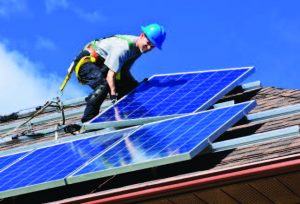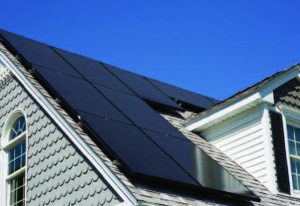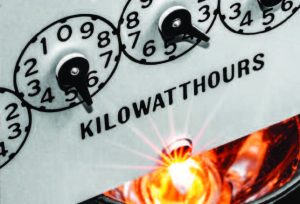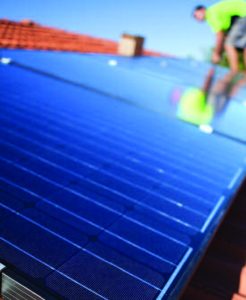So what’s the deal with Solar?
By Erika Kemp and Stephen Smith
Uncle Mark gets at least five calls a week about free solar. “Hello, are you the homeowner? My name is Chris…I am calling to tell you about a great new program that can dramatically lower your energy bills.” Chris sounds like he’s calling from 10,000 miles away and he probably is. He is reading off a script. And there is no way his name is Chris.
For better or worse, this is the voice of solar in New Jersey—a state well-marinated in shams, scams and telemarketing schemes. So, needless to say, Chris won’t be selling Uncle Mark any solar today.
Which is a shame, because New Jersey is a very active solar market with more than 550 firms competing for new business. Indeed, the Garden State was an innovative and early adopter of solar power when it embraced its Renewable Portfolio Standard (RPS) policy in 2005. As a result, solar power in New Jersey is well understood and the market is mature in terms of cost efficiencies, competition amongst suppliers, and predictable return on investment for homeowners and businesses interested in going solar.
The state’s Solar Renewable Energy Program (SREC) in particular demonstrates New Jersey’s commitment to solar power. Basically, it says that every megawatt hour of energy produced by a Jersey-based solar system can be bought, sold or traded to another entity in the state for their use in complying with the state RPS, or their own corporate renewable energy goals.
As a result, New Jersey is the fourth-largest solar state market in the country.
The next time Chris (or one of his fellow telemarketers) interrupts dinner, you and Uncle Mark might want to give him the time of day. The industry is robust, the deals are appealing and the technology is solid. That being said, this is a significant financial decision. So before you go solar in 2016, consider the following 8 questions:
Why do I get so many calls from sketchy telemarketers offering me “free” solar?
Because “customer acquisition” is now the most expensive part of selling a residential solar system. It is hard to believe that solar firms find cold-calling to be an effective strategy for such a personal and significant investment. They are pushing to make sales with as little upfront investment as possible, hence the seemingly asinine telemarketing approach. Solar power equipment and labor costs have plummeted in the past 10 years; it is now more expensive and takes longer for a solar company to find and close a deal with a client than it is for the company to build the system. As a result, solar companies are pushing hard to source clients as cheaply and efficiently as possible.

www.istockphoto.com
Is solar worth it?
It is if you have high electricity rates—and electricity rates in New Jersey are higher than the majority of U.S states. This is one of the most expensive electrical utility markets in the northeast. Going solar helps homes offset high electricity bills by producing your own electricity and, in some cases, you can sell excess electricity generated back to the utility company using a methodology called “net-metering” (see question #7). For a fixed expense, residential solar customers have a predictable amount of electricity at a predictable cost during a time when the price of electricity has the potential to soar.
Generous state and federal tax credits also come into play. The federal Tax Investment Credit (ITC) that encourages solar and renewable energy investment has contributed massively to the growth of solar across the U.S. It provides a tax credit for homeowners and businesses that equals 30 percent of the total solar-system investment cost. The ITC was extended by Congress last December and is currently set to expire in 2023.
There is also a nice mix of state policies and utility incentives available to New Jersey businesses and homeowners. These include the aforementioned New Jersey Renewable Portfolio Standard, which mandates that 1 percent of energy produced in the state of NJ must come from solar power by 2028. This legislation is managed by the New
Jersey Board of Public Utilities (BPU), which ensures that New Jersey utilities comply by managing the rollout of residential, commercial and utility-scale solar generation programs across the state. Another is the Solar Renewable Energy Credits program, the primary vehicle the state has used to implement its RPS. Homeowners can register to sell the credits they get from owning an operating solar system in New Jersey to companies that aggregate and then sell them off. Finally, check with your local utility for Utility-Specific Incentive Programs being offered current and prospective customers for going solar.

www.istockphoto.com
Are all solar companies basically the same?
No. In fact, there are three distinct types—third-party system owners, building contractor firms, and solar installers—and it’s important to understand the pros and cons of working with each.
Third Party System Owners are larger companies like Verengo, SunRun and SolarCity. They offer people various financing options, including leases and loans (in addition to installation services). The name of this category stems from the fact that you do not own the system on your roof. These are the calls you get when you’re sitting down to dinner. Interestingly, there’s not a state in the U.S. with more third-party party owned systems than New Jersey. The rapid reduction in the price tag of residential solar systems since around 2010 has weakened the appeal of these deals somewhat. However, if you don’t have the cash, this may be the most affordable route to going solar.

www.istockphoto.com
Building contractor firms are smaller, contractor-based firms specializing in general construction, electrical work or roofing work that now also offer solar installation services. To compete with larger finance firms, building contractors typically partner with a lender to offer options to homeowners who are looking to finance. But they also offer systems for outright purchase. They are typically regionally focused and can offer more personalized customer service than the larger companies. You are unlikely to receive cold calls from these companies—they tend to rely on referrals and traditional advertising.
Solar installation firms are strictly installers of solar systems. They have similar qualities to building contractors, but are more likely to have the best overall understanding of solar equipment performance. They have connections with established contractors who can handle any roofing or electrical infrastructure needs demanded by a project. The personal service and attention a smaller installer offers is the polar opposite of the cold-call experience. One disadvantage of working with smaller installers, however, is that they may be unable to offer a diversity of brands and equipment because of exclusivity agreements they could have with a manufacturer.
What are the must-ask questions I need answered by an installer before I sign up for solar?
- Do you have the electrical license required? Is your contractor license current?
- Can you demonstrate experience with similar residential solar projects, as well as with the equipment you are proposing for my roof?
- With whom have you worked locally? A good installer should be able to supply you with a name and phone number…even better, a visit with the homeowner. References matter.
- Where are your components—specifically your modules and solar inverters—manufactured? Solar power component manufacturing is an international business. Installers offer products from Asia, Europe and the Americas, typically, and there are differences in certain equipment that result in varied pricing. If buying equipment made in the U.S. is important to you, ask the installer what American-made options are available for you.
- What kind of warranties do you offer for workmanship and for components? Each solar system is different. Solar module warranties should run 20 years at a minimum and most solar inverter warranties are now 10 years. A solar inverter allows the modules to be installed in less-than-optimal (i.e., shady) conditions and still generate plenty of power.
- Be sure to ask about the equipment and workmanship warranties, as well as whether any planned or unplanned maintenance is included in the contract.
- Who handles operations and maintenance, how frequently and for how long? Your installer should show you an “O&M” plan, complete with module cleaning and a routine maintenance schedule, along with various service packages for system maintenance. There shouldn’t be much needed, as solar systems essentially have no moving parts. In the case of third-party owned systems, all maintenance is performed by the third party. As with any other investment and/or home improvement, it is important to get multiple bids and compare them before selecting an installer.
Will this technology become obsolete in a couple of years, like my computer and my cell phone?
No. The product cycle time for solar components is actually quite long, so it’s likely you’re getting up-to-date components. Solar equipment technology has not evolved significantly in the past few years, which is a good thing for consumers because it has allowed banks, system owners, installers and manufacturers to develop a detailed understanding of how systems work and produce energy. This helped a maturing of their perspectives on solar power without the additional need of analyzing significant technological changes at the same time. The development of smaller micro-inverters for the residential market is probably the biggest development for residential and smaller commercial systems in the past five years. Micro-inverter companies are established enough to be well understood by installers, and manufacturers offer warranty terms equaling those of traditional inverter manufacturers.
How are people financing these systems if they can’t afford the cash outlay?
Even though system prices have dropped, solar leases are still popular. Leasing a system is a good option to go solar without any upfront costs, however, be aware that the system is owned by the leasing company—which means it gets the ITC and incentive benefits, not you. Even so, solar financing is big business in New Jersey. Personal loans and home equity loans are always options. Since system costs have declined, you may want to reach out to your bank and price out a loan or home equity line to finance your purchase. That way you receive all the incentives and tax benefits. Or you could put it on plastic.
Consult your accountant (or Google around) to better understand how to consider the ITC tax benefits relevant to your personal tax situation. And, of course, make sure to ask to see all the financing and contract terms before agreeing to anything. Some companies ask buyers to sign on the dotted line through email or web-based signatures before sharing the financial details. Better to deflect the commitment and make sure you understand the small print beforehand.

www.istockphoto.com
If I generate more power than I use, how can I sell it?
Net Metering is the general term used to explain how system owners can sell power to utilities. Essentially, signing a net metering contract with your utility means your utility will purchase back the same amount of energy you use, for the same price it sells you that energy. Energy production beyond this amount doesn’t receive any credit from the utility, so it is important to size your system correctly with your installer’s help and guidance.
How do I know I’m getting the best deal for my system?
Hey, this is New Jersey. There’s nothing wrong with squeezing the installer a little! Let the company know you are looking at multiple bids. This may bring the price down, but it also creates an opportunity to explain what is different/better about the products and service the seller is offering. Remember that there are lots of options available to install your solar system, and it’s a long-term investment, so don’t compromise on what you want out of the deal.
It is also helpful to know your average monthly and annual usage before you enter into conversations with installers. This shows them you know what you are doing, and will make them more accountable to you during the entire sales process. Finally, ask about product options and warranty terms when meeting your installer. Showing a little knowledge of the primary system components— modules and inverters, for instance—and asking the installer to explain warranty terms can help you form a good comparison between products and position yourself well for the price and terms negotiations. Knowledge is power in the hands of the solar client.
The take-away here is that, for New Jerseyans, this looks to be a smart time to go solar. This is one of the most mature and healthiest solar markets in the nation. The current prices for solar power—combined with newly renewed federal and state incentives—means the return on investment for a solar system in the Garden State has never been higher. In addition, utilities and permit agencies in New Jersey are very familiar with the regulations and requirements governing solar power installations, which further drives down the non-system costs associated with going solar. And, as mentioned earlier, technological advances are occurring at a stable, consistent rate, allowing financers and installers to thoroughly understand solar power technology.
So are these telemarketers on the level?
They almost certainly are. If you hear them out, they are likely to set up a call with someone more skilled and informative. The reason you are not talking to these folks first is just a matter of economics. That being said, a solar system is an expensive and complicated electrical appliance you are attaching to the roof of your home. It would be nice to feel like that first contact was a solar expert but, as Uncle Mark is so painfully aware, it’s not.
THREE FOR THE MONEY
Third Party System Owners
PROS
- Responsible for maintenance
- Low or no upfront capital cost
- Low risk
CONS
- Typically higher system pricing for financed systems
- No ITC
- Fixed contract
- Monthly payment
- Typically not local
- Less local customer service
Building Contractors
PROS
- Local focus
- Good customer service
- Competitive pricing
- Experience with solar and roofing
CONS
- Less competitive financing options
- Limited product offerings
Solar Installers
PROS
- High competition, good pricing
- Lots of solar experience
- Local focus
CONS
- Can be tied to specific product or finance partners
- Less experience with specialized construction needs

www.istockphoto.com
Editor’s Note: Erika Kemp and Stephen Smith are the co-owners of Solvida Energy Group (solvidaenergy.com), a consulting firm that analyzes solar market technical and industry trends. They are also “newly solar” homeowners, having opted to purchase their own system, and are frequent visitors to one of the first solar-powered homes on the Jersey shore. Special thanks to Scott Moscowitz, Director at GTM Research in Boston, who provided valuable insight to the current state of solar in the Garden State.





